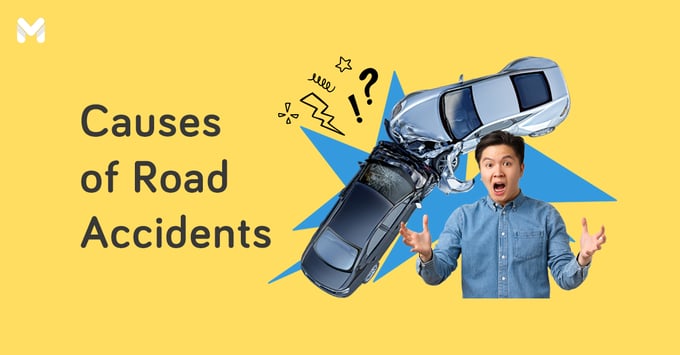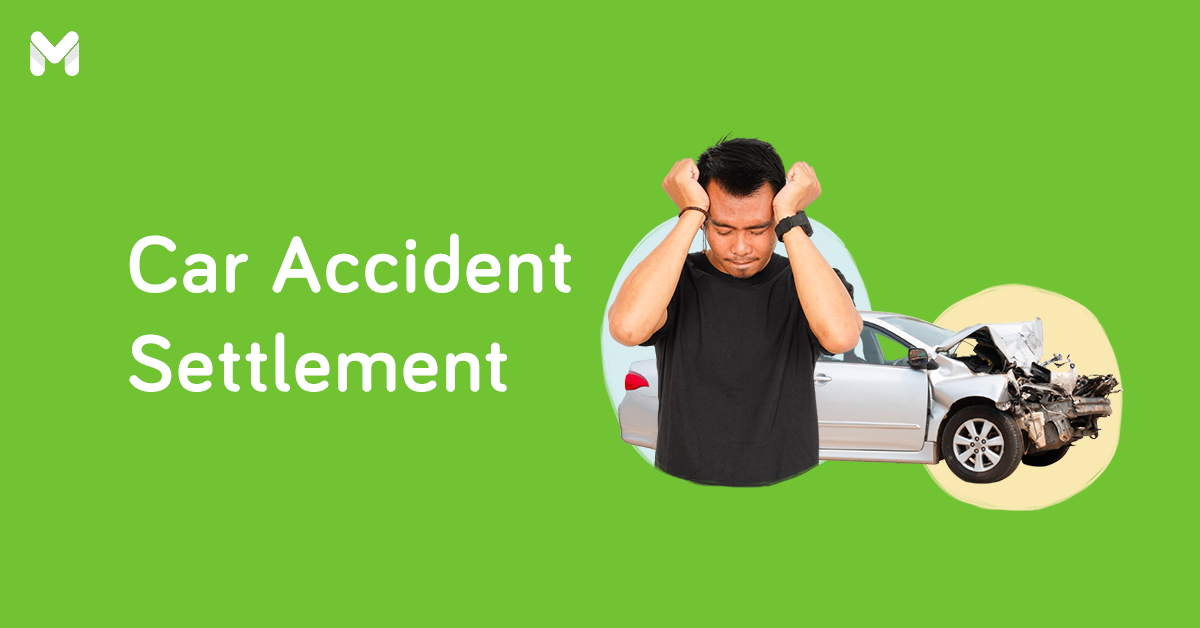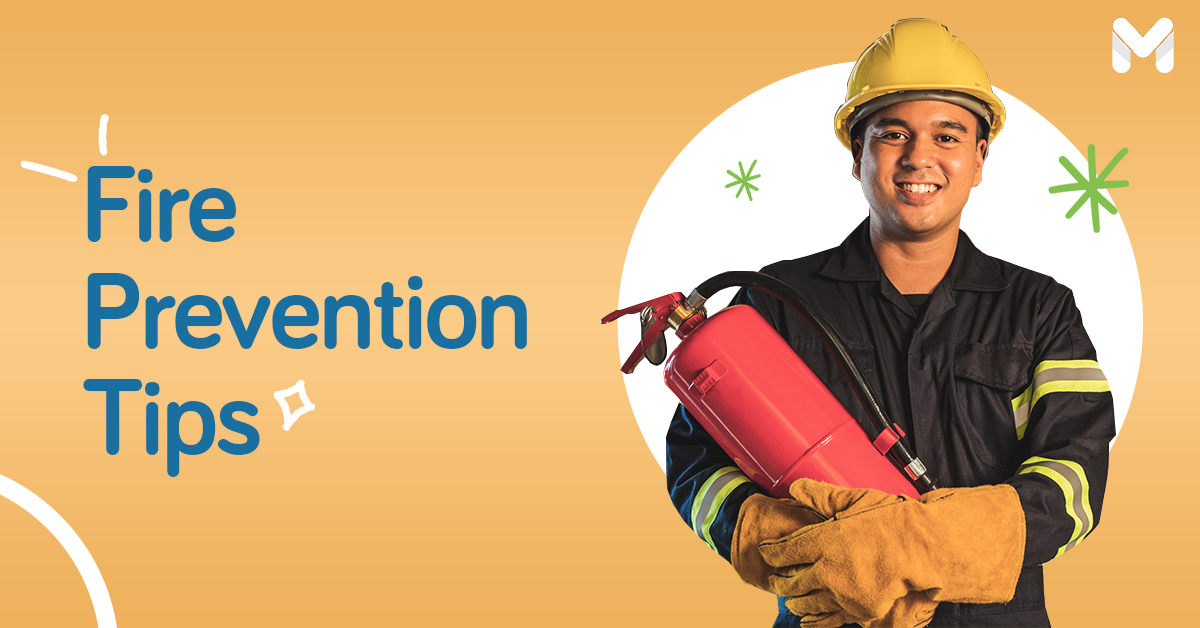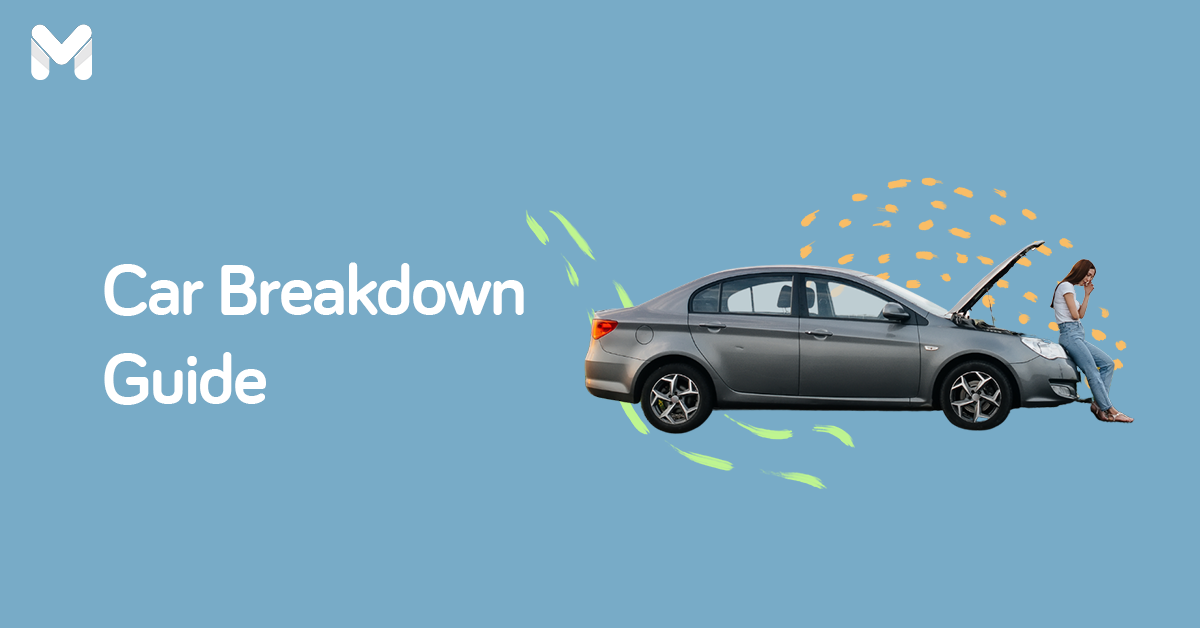Statistics on road accidents in the Philippines all paint the sorry state of traffic safety in the country.
From January to July of 2023, the Metropolitan Manila Development Authority (MMDA) recorded more than 44,000 vehicular accidents in Metro Manila. Over 32,000 resulted in damage to property, with 11,525 non-fatal injuries and 168 fatal injuries.[1]
To be a wise driver, you need to know the risks on the road. Arm yourself with knowledge with this list of the top causes of road accidents in the Philippines.
Top 9 Causes of Road Accidents in the Philippines
-3.png?width=600&height=400&name=Pics%20for%20blog%20-%20600x400%20(40)-3.png)
Based on data from the MMDA and the Philippine National Police-Highway Patrol Group (PNP-HPG),[2] here are the top causes of road accidents in the Philippines. Note that human error accounts for most of these incidents.
You’ll also learn a few tips to avoid such road catastrophes.
🚗 Loss of Control
Loss of control over a car is usually caused by a tire problem. The tire either blows out or loses traction. Skidding also happens when the road is slippery, which inadvertently results in road accidents.
When you feel like you’re losing control over your car, remember: don’t panic. Panicking will only cloud your judgment, leading to actions that will cause more damage. Focus on the road and stay aware of your surroundings.
Avoid slamming on the brakes. Instead, apply pressure steadily to prevent losing control further.
How to Avoid Loss of Control
- Before hitting the road, check the pressure of your tires. If something is amiss, get the pressure adjusted.
- Replace tires when necessary. If you’ve been using them for more than three or six years (depending on your car), you need new ones.
- While you’re at it, check the mechanisms of the wheel.
- Road surfaces become slick during rainy seasons. If possible, wait for the rain to subside and for the roads to dry. But should you need to go immediately, choose a route with safer road conditions.
Read more:
- How to be Safe During the Rainy Season? Follow These Road Safety Tips
- Flood-Prone Areas in the Philippines: Places to Avoid While Driving
🚗 Drunk Driving
-3.png?width=600&height=400&name=Pics%20for%20blog%20-%20600x400%20(41)-3.png)
Driving under the influence of alcohol is one of the top causes of road accidents. Alcohol slows the driver's reflexes, weakens reasoning, and affects motor skills—making anyone unfit to drive.
Despite government warnings and news about road accidents due to drunk driving, people still get behind the wheel even when they have one too many.
How to Avoid Drunk Driving
- Get a designated driver behind the wheel.
- Hail a taxi or book a TNVS (e.g., Grab or JoyRide car). While expensive, it’s worth it to get home safely. Avoid booking motorcycle taxis. Drunk riding is prohibited by some motorcycle-based TNVS companies.
- Ask to stay the night. If you’re at your friend’s house, ask if you can crash in their living room.
- If you know you’ll be drinking alcohol, don’t bring your car.
- The best thing would be to avoid drinking altogether for the night. If you still want to socialize, just get a mocktail.
Read more: All You Need to Know About the Anti-Drunk and Drugged Driving Law
🚗 Mechanical Failure
Common mechanical troubles that lead to road accidents include worn-out/under-inflated tires, suspension and steering issues, headlight/taillight malfunction, engine and transmission problems, and faulty windshield wipers.
If these problems aren’t addressed as soon as possible, your vehicle is simply a car accident case waiting to happen.
For instance, problematic brakes may cause a collision. Light-related malfunctions may make your car invisible, especially at night or during rainy days. This may cause other vehicles to collide with yours.
How to Avoid Mechanical Failure
- Make it a point to check BLOWBAGETS (battery, lights, oil, water, brake, air, gas, engine, tires, and self) to avoid any mechanical defect, especially before long trips.
- If you hear strange noises, such as grinding and clunking sounds, take your car to the mechanic right away.
- Don’t skip scheduled preventive maintenance.
Read more: 10 Driving Tips to Make Late Night Driving Safer
🚗 Brake Failure
-3.png?width=600&height=400&name=Pics%20for%20blog%20-%20600x400%20(42)-3.png)
Brake failure is another mechanical defect that often leads to road accidents. We're discussing this separately to emphasize just how dangerous—yet preventable—it is.
There are many reasons behind brake failures. For one, the brakes might have gotten hard or brittle. In turn, they can’t grip the wheel rotor disk properly, making it difficult to stop the car.
Low brake fluid level is another reason. When this happens, the wheel cylinders don’t receive enough pressure from your brake pedal.
How to Avoid Brake Failure
- Perform regular inspections on your brake system to detect early signs of failure, such as brake fluid leaks and overheating.
- Don’t overload your car. If your vehicle is full and heavy, your brakes and other mechanical parts will have to work harder.
- Drive within the speed limit. Maintaining the right speed will allow you to hit the brakes in time, preventing accidents.
🛡️ Drive Safely with Car Insurance
Car accident without insurance? These are words you don’t want to hear.
A car insurance policy protects you financially—not only from road accidents but also other mishaps, such as natural calamities, theft, and more.
Get the right car insurance with Moneymax. Compare your options:
| Car Insurance Company | Maximum Total Sum Insured | CTPL Coverage | Own Damage & Theft Coverage | Acts of Nature Coverage | Death / Disablement Coverage |
|
FPG Insurance
|
₱4 million
|
✔️
|
✔️
|
✔️
|
|
|
Malayan Insurance
|
₱7.5 million
|
✔️
|
✔️
|
✔️
|
|
|
The Mercantile Insurance Corporation
|
₱5 million
|
✔️
|
✔️
|
||
|
OONA Insurance (formerly MAPFRE)
 |
₱5 million
|
✔️
|
✔️
|
✔️
|
✔️
|
|
PGA Insurance
 |
₱3 million
|
✔️
|
|||
|
SGI Philippines
|
₱5 million
|
✔️
|
✔️
|
✔️
|
|
|
Standard Insurance
|
₱5 million
|
✔️
|
✔️
|
✔️
|
✔️
|
|
Stronghold Insurance
|
₱3 million
|
✔️
|
🚗 Overspeeding
Blame it on the adrenaline rush—we often see motorists who enjoy driving as if they're on a racetrack. Other drivers break the speed limit because they're in a hurry.
Regardless of what drives them to do that, nothing can justify recklessness on the road. Pedestrians, other motorists, and sometimes the driver’s own passengers get injured in auto accidents because of overspeeding.
When you drive too fast, your control over your car is compromised, making it difficult to navigate turns and curves. You won’t have enough time to avoid a crash.
Due to the high impact brought about by speed, the effects of overspeeding may be more severe than those of usual road accidents.
How to Avoid Overspeeding
- If your car is equipped with cruise control, use it. That way you won’t need to set your foot on the gas.
- Avoid drinking and driving. Drunk drivers tend to overspeed. What’s worse is their reflexes are compromised, preventing them from reacting to road hazards in time.
- Leave home early. When you have enough time, you won’t need to speed through the road to avoid getting late.
- Stress, anger,[3] and similar negative emotions may lead to overspeeding. Learn to manage your emotions.
🚗 Use of Gadgets While Driving
-3.png?width=600&height=400&name=Pics%20for%20blog%20-%20600x400%20(43)-3.png)
Every driver knows the importance of keeping their eyes on the road—but it can be a challenge for those who need to multi-task (like texting or making calls while driving) or want to check their social media feeds. As a result, their reaction time is affected.
The government bans the use of mobile phones and other electronic devices while driving.
How to Avoid Use of Gadgets While Driving
- Turn on your phone’s Do Not Disturb function before getting behind the wheel. That way, you won’t get distracted by the chime of notifications. An alternative would be the Airplane mode.
- If you’re listening to music while driving, pick your playlist before driving off. You won’t need to find your preferred music while cruising down the highway.
- Rely on hands-free applications like Apple CarPlay or AndroidAuto. Delegate texting, navigating the road, and playing music to Siri or Google Assistant.
Read more: Eyes on the Road, Hands on the Wheel: What to Know About the Anti-Distracted Driving Act
🚗 Bad Turning
Authorities often cite bad turning as one of the top causes of car accident cases. This bad driving practice involves changing direction without turning the signal lights on.
Turning without signaling is not only dangerous—it also shows a lack of consideration for other drivers. It's never easy for any driver to adjust speed and direction in the blink of an eye.
How to Avoid Bad Turning
- Simply use your signal lights to tell other drivers where you’re going.
- Identify the correct lane before turning. Better yet, switch to the right lane early on so you won’t have to do it at the last second.
- Before turning or switching to another lane, check your car’s distance from the cars behind you.
🚗 Bad Overtaking
-3.png?width=600&height=400&name=Pics%20for%20blog%20-%20600x400%20(44)-3.png)
Overtaking occurs when a driver moves ahead of another vehicle. It leads to accidents when the erring driver suddenly switches lanes without checking the rear-view or side mirror.
Collision is also likely to happen when the other driver miscalculates the distance and speed of an oncoming vehicle from another lane.
How to Avoid Bad Overtaking
- Maintain your speed if you see that the car behind you is trying to overtake. Just let the overtaking vehicle get ahead of yours.
- Don’t attempt to get ahead of another car if you can’t see the road ahead. You could be heading towards a sharp turn.
- Check the markings on the road. If the road has double solid lines, that means you’re not allowed to overtake. Look out for road signs telling you not to overtake as well.
- Be extra careful when overtaking large vehicles like trucks. They have more blind spots, making it harder for them to see your car.
🚗 Jaywalking
The Land Transportation and Traffic Code (Republic Act 4136) requires drivers to let pedestrians cross the road, as long as they're within a pedestrian lane.
But the problem is that pasaway pedestrians cause as much trouble as kamote drivers do. For instance, they may catch the driver by surprise, even if the latter is driving within speed limits.
How to Avoid Jaywalking-Related Accidents
- As much as possible, give way to pedestrians to avoid hitting them. This is a better alternative to sending them to the hospital and paying for the bill.
- Be extra aware of your surroundings, especially when driving through residential areas.
- Drive within the speed limit.
Read more: 6 Traffic Laws in the Philippines to Remember When Driving
Here's a quick summary of the top causes of road accidents in the Philippines:
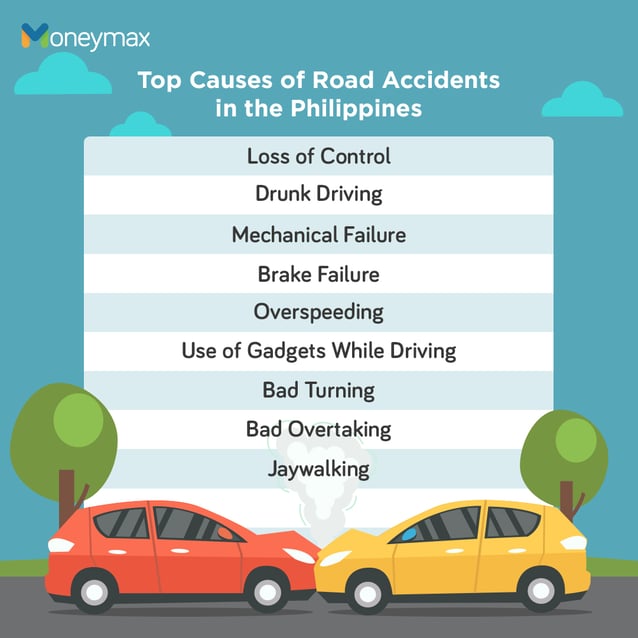
Final Thoughts
Don’t worry, you can prevent the causes of road accidents in the Philippines. To ensure you're safe each time you drive, be knowledgeable about traffic laws and rules, drive carefully along accident-prone roads, and regularly maintain your car.
Don't forget to avail of a car insurance policy as well! Get a free quote from Moneymax by clicking the banner below:
Sources:
- [1] MMDA Records 44,493 Vehicular Accidents in Metro Manila from Jan to July (Philippine Daily Inquirer, 2023)
- [2] HPG: October, November Deadliest Months for Road Mishaps (Philstar Global, 2023)
- [3] Anger Management: 10 Tips to Tame Your Temper






